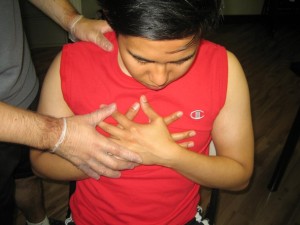Wheezing is the term used to describe the noise produced once air is forced into the respiratory airway which became narrow due to asthma or other respiratory problems. Take note that it is considered as the first and indicative sign of an asthma attack or respiratory illness. With this in mind, there are certain steps that must be taken to prevent further problems from occurring.
Causes of wheezing
- Asthma has been the most common cause of recurrent wheezing. It is vital to note that individuals can have asthma yet do not show any sign of wheezing. Even though it is a symptom of asthma, it is not always present in all cases. It is important to consult a doctor if the individual starts wheezing and other symptoms of asthma are present such as tightness in the chest, shortness of breath, difficulty sleeping and coughing. If you want to learn the appropriate measures to perform during an asthma attack, click here.
- Common cold can also cause wheezing once the chest is congested. Take note that the cold and wheezing will eventually go away as long as the individual gets enough rest as well as drinking a lot of fluids. The wheezing is caused by the congestion. Nevertheless, a cold can turn into pneumonia and if the wheezing persist, it is best to consult a doctor.
- Pneumonia develops once the lungs become irritated and inflamed, usually by infection. It can lead to coughing and wheezing and often occurs after an illness or a cold. In most cases, the cough is hard enough to cough up phlegm and can be accompanied by fever. Due to the infection and inflammation in the lungs, it can be difficult for the individual to breathe which leads to intermittent or constant wheezing.
- Bronchitis is the inflammation of the bronchial tubes which are the tubes responsible for transporting air back and forth to the lungs. The symptoms include wheezing, coughing, fatigue, shortness of breath and chest discomfort.
How to stop wheezing

Wheezing can be stopped by taking one dose of prescription medication such as albuterol that is delivered through a hand-held inhaler or nebulizer. It can help relax and open up the respiratory airways, stop the condition and allow the individual to breathe easily.
Other ways to stop wheezing
- The individual can drink a cup of hot liquid once every 15 minutes. Take note that the hot liquid will help soothe and relax the airways. The heat will also loosen up any mucous that contributes to the wheezing.
- When coughing, instruct the individual to pat firmly his/her chest in order to break up and eject the mucous. The build-up of phlegm due to cold or respiratory illnesses will make breathing difficult and cause a wheezing attack.
- It is best to know what triggers the wheezing. In some cases, the wheezing can be triggered by dust, smoke, pollen or other airborne irritants. It is important to prevent exposure by staying indoors or using a face mask to stop a wheezing attack.
